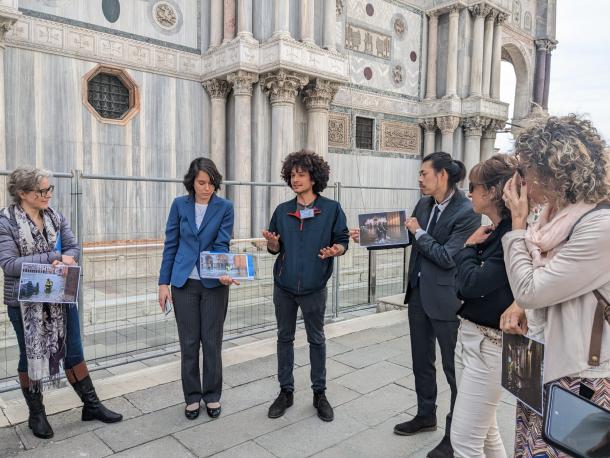The SHELTER project was implemented by TECNALIA in cooperation with a multidisciplinary and complementary Consortium of 23 partners that represent 7 SMEs, 1 EEIG (European Economic Interest Groupings), 10 research organisations, 4 public bodies and 1 policy maker.
UNESCO, through its Regional Bureau for Science and Culture in Europe, actively contributed to the project's development as one of the project's partners, notably through the Sava River Basin Open Laboratory, which was jointly coordinated with the International Sava River Basin Commission.
About 100 participants in person and 30 online from more than 20 Member States partner countries participated in the conference to learn about the SHELTER project results from the past 4 years, test the tools developed and discuss possible follow ups.
The conference was opened by Ana Luiza M. Thompson-Flores, Director, UNESCO (Geneva Liaison office and Regional Bureau for Science and Culture in Europe); Piret Noukas, Project Officer, European Commission; Veronica Piacentini, the Italian Civil Protection Department; and, Massimiliano De Martin, Councillor in Urban Planning, Environment and Private Building, City of Venice.
The beauty of an interdisciplinary community is that we are all working towards the same objective: increasing resilience, reducing vulnerability and strengthening disaster risk governance for prevention, preparedness, response, recovery and rehabilitation of our natural and cultural heritage.Ana Luiza M. Thompson-Flores, Director
"The SHELTER project demonstrates that it is possible - as the Sendai Framework for Disaster Risk Reduction 2015-2030 Priority Action 2 calls for - to have a clear vision, plans, competence, guidance and coordination within and across sectors, as well as participation of relevant stakeholders", Thompson-Flores underlined. After the welcome from UNESCO and the Italian authorities, the Coordinator, TECNALIA, provided an extensive overview of the SHELTER project.
Throughout the morning, a series of key challenges and outputs were presented by the project partners, namely: data and knowledge extracts; systemic historic area resilience assessment and monitoring; collaborative planning for building low-carbon systemic resilience; community approach and resilience financing; solutions and tools; and, the data-driven platform. The afternoon session placed an intensive focus on the Open Labs in particular, at a dedicated fair, audience members could interact with project leaders and discuss the lessons learnt from each lab and their replicability.
The main SHELTER output, the Operational Knowledge Disaster Risk Reduction Framework, was developed and implemented on a multiscale and multisource data-driven platform, the SHELTER Resilience Dashboard, and aimed to generate resilience and improve the reconstruction of historic areas in the face of climate change and hazard events, while also providing the necessary information for planning and adaptive governance.
This resourceful platform for local authorities, urban planners, conservation practitioners, first responders, cultural heritage owners and managers aimed to guide historic areas in their transformation towards more resilient, circular, smart and inclusive historic environments, and take advantage of the window of opportunity that the awareness, adaptation and preparations against hazards provide.
All the developments of the project have been validated in 5 Open Labs, representative of the main climatic and environmental challenges in Europe and the different types of heritage. These Open Labs are situated in the World Heritage site of the old town of Dordrecht and its island (Netherlands), the Area of Santa Croce in Ravenna (Italy), the coastal district of Seferihisar (Türkiye), the Baixa Limia-Serra do Xurés Natural Park in Galicia (Spain) and the transboundary Sava River Basin (Bosnia and Herzegovina, Croatia, Montenegro, Serbia and Slovenia and a small portion of Albania).
Following the presentation of SHELTER tools, trial sessions were then conducted to show their high replication potential, and representatives from the 5 Open Labs demonstrated the achievements they were able to attain by implementing the tools and developed solutions.
The SHELTER team can be very proud of what has been achieved in these 4 years of continuous and close interdisciplinary work between our cases studies and technical partners to enhance community-based resilience through data-driven tools and approaches.Aitziber Egusquiza Ortega, Project Coordinator, SHELTER
"Research projects such as SHELTER have to prove that interdisciplinary collaboration, co-creation and citizen engagement are not only buzzwords, they are also the way to protect our common heritage," Aitziber Egusquiza said. Closing the day, ALPHA, as the leader of the exploitation activity, presented the plenary on the 'Future of SHELTER' and set the stage for the two dedicated panels on 'Research applied to policy' and 'Impact of research-developed solutions in heritage domain' with the involvement of several recognised speakers and industry experts.
On the second day, UNESCO together with local stakeholders from Venice and SHELTER partners used the project tool to simulate the worst flooding suffered on 12 November 2019 by the World Heritage site of 'Venice and its Lagoon' since 1966. Final Conference participants during the field visits met witnesses of that event: city authorities, site managers, researchers and regular citizens to discuss how natural disasters affected the life of the city at all levels and tested the functionality of one of the project developed tools - SHELTER Chatbot - showing its great replicability potential.







